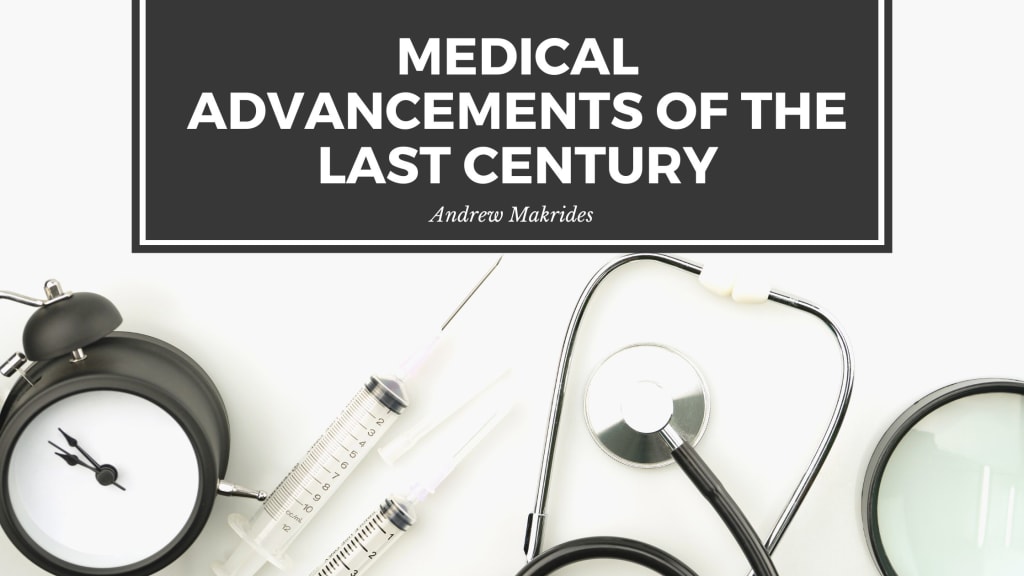Medical Advancements of the Last Century
Andrew Makrides discusses medical advancements humanity has made over the last century.

The field of medicine has witnessed remarkable progress and advancements over the last century, revolutionizing healthcare and transforming how we prevent, diagnose, and treat diseases. From groundbreaking discoveries to technological innovations, these medical advancements have significantly improved patient outcomes, extended life expectancy, and enhanced the overall quality of life.
Let's explore some key medical advancements that have shaped the healthcare landscape in the last century.
Antibiotics and Vaccines:
The discovery and widespread use of antibiotics, starting with penicillin in the 1940s, has revolutionized the treatment of bacterial infections. Antibiotics have saved countless lives by effectively combating bacterial diseases that were once fatal, such as pneumonia, tuberculosis, and sepsis. Vaccines have eradicated or significantly reduced the prevalence of diseases like smallpox, polio, measles, and diphtheria, improving global health.
Imaging Technologies:
The development of imaging technologies such as X-rays, computed tomography (CT), magnetic resonance imaging (MRI), and ultrasound has transformed medical diagnostics. These imaging modalities allow healthcare professionals to visualize internal structures of the body, aiding in the early detection and accurate diagnosis of various conditions. They have revolutionized fields like radiology, cardiology, and oncology, enabling precise planning of treatments and interventions and reducing the need for invasive procedures.
Organ Transplantation:
Organ transplantation has emerged as a life-saving treatment option for patients with end-stage organ failure. The development of immunosuppressive drugs to prevent organ rejection, improved surgical techniques, and advancements in tissue typing and organ preservation have significantly increased the success rates of organ transplants. Transplants of vital organs such as the heart, liver, kidneys, and lungs have given thousands of patients a second chance at life and improved their quality of life.
Minimally Invasive Surgery:
The advent of minimally invasive surgical techniques has revolutionized the field of surgery. Procedures like laparoscopy and robotic-assisted surgery allow surgeons to perform complex operations with smaller incisions, reduced blood loss, and faster recovery times. These techniques have transformed various surgical specialties, including gynecology, urology, and orthopedics, reducing pain, decreasing hospital stays, and improving patient outcomes.
Genomics and Personalized Medicine:
Completing the Human Genome Project in 2003 marked a significant milestone in medical research. Genomic studies and advancements in DNA sequencing technologies have paved the way for personalized medicine. Understanding the genetic basis of diseases has enabled the development of targeted therapies tailored to an individual's genetic makeup. Precision medicine has revolutionized cancer treatment by using targeted therapies and immunotherapies that specifically attack cancer cells while sparing healthy tissues. It also holds great potential for other complex conditions, leading to more effective and personalized treatments.
Telemedicine and Digital Health:
Telemedicine allows patients to access medical care remotely, improving access to specialists, reducing travel time, and increasing convenience. The use of telemedicine has been particularly significant in rural and underserved areas. Additionally, digital health technologies such as wearable devices, health monitoring apps, and electronic health records have enhanced patient care, enabled remote patient monitoring, facilitated data analysis, and empowered individuals to manage their health.
Stem Cell Research and Regenerative Medicine:
Stem cells have the potential to differentiate into various cell types and tissues, offering opportunities for tissue repair, organ regeneration, and novel therapies. Research in this field has shown promising results in conditions like spinal cord injuries, cardiovascular diseases, and degenerative disorders, offering hope for future breakthroughs and improved treatment options.
The last century has witnessed remarkable advancements in medicine that have transformed healthcare in unprecedented ways. The medical field has made tremendous progress, from antibiotics and vaccines that have revolutionized disease prevention and treatment to imaging technologies, minimally invasive surgeries, and organ transplantation, improving patient outcomes. Furthermore, genomics, telemedicine, digital health, stem cell research, and regenerative medicine have opened new avenues for personalized care and innovative treatment approaches. These medical advancements have extended human life expectancy and enhanced the overall quality of life for millions of individuals worldwide. As technology evolves and research progresses, the potential for further medical breakthroughs and advancements is vast, promising a brighter future for global healthcare.
About the Creator
Andrew Makrides
Andrew Makrides is an experienced medical professional with nearly two decades of experience as a board-certified anesthesiologist. He is licensed to practice in both New York and Pennsylvania and currently lives in Lancaster, PA.






Comments
There are no comments for this story
Be the first to respond and start the conversation.